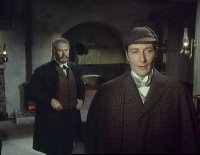The Earth Dies Screaming (1965)
 The great Terence Fisher, whom regular readers will have figured out is one of my alltime favourite directors, only very occasionally forayed onto non-Hammer territory. One of those times was in the mid-1960s, when he had fallen temporarily out of favour with Hammer, due to financial failures like The Phantom of the Opera (1962) and The Gorgon (1964). From 1965 to 1967, he made a handful of science-fiction films for low-budget companies. The Earth Dies Screaming was made in 1965 for Lippert Films, whose other main contribution to '60s horror was Curse of the Fly, earlier the same year.
The great Terence Fisher, whom regular readers will have figured out is one of my alltime favourite directors, only very occasionally forayed onto non-Hammer territory. One of those times was in the mid-1960s, when he had fallen temporarily out of favour with Hammer, due to financial failures like The Phantom of the Opera (1962) and The Gorgon (1964). From 1965 to 1967, he made a handful of science-fiction films for low-budget companies. The Earth Dies Screaming was made in 1965 for Lippert Films, whose other main contribution to '60s horror was Curse of the Fly, earlier the same year. The Earth Dies Screaming is an enjoyable yarn which, at not much over an hour, is the perfect length for a movie of its era and genre. It opens in a way that recalls the wonderful Village of the Damned (1960), with people up and down the country mysteriously collapsing - commuters crumple to the ground where they stand, trains leave their tracks. A few survivors are holed up in the local pub (as happens again in Fisher's 1967 Night of the Big Heat), and must battle an onslaught from alien visitors.
The Earth Dies Screaming is an enjoyable yarn which, at not much over an hour, is the perfect length for a movie of its era and genre. It opens in a way that recalls the wonderful Village of the Damned (1960), with people up and down the country mysteriously collapsing - commuters crumple to the ground where they stand, trains leave their tracks. A few survivors are holed up in the local pub (as happens again in Fisher's 1967 Night of the Big Heat), and must battle an onslaught from alien visitors. The cast is mostly unknown, at least to me. I enjoyed Dennis Price's rather shifty turn; it was not long before he fell on hard times and was reduced to appearing in some very seedy rubbish. Hammer regular Thorley Walters also has a small part, which I found strikingly sympathetic.
The cast is mostly unknown, at least to me. I enjoyed Dennis Price's rather shifty turn; it was not long before he fell on hard times and was reduced to appearing in some very seedy rubbish. Hammer regular Thorley Walters also has a small part, which I found strikingly sympathetic.Perhaps one of the film's finest features is Elisabeth Lutyens's haunting score. Lutyens was an avant-garde composer who, like many "serious" composers, regarded her film music as a necessary evil. However, she produced brilliant scores for British horrors such as Dr Terror's House of Horrors and The Skull. The music here is pivotal to the tension; combined with Fisher's usual expert direction, the film has some genuinely scary moments.
My rating? * * * * *








